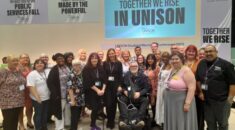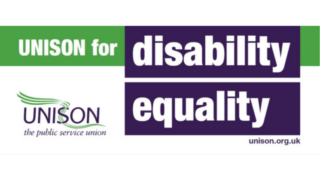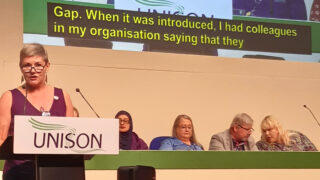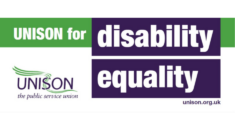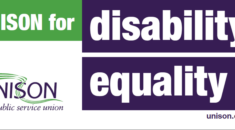The Disability Discrimination Act was passed in 1995. So, “We’ve had 20 years of no discrimination, 20 years of equality,” joked national disabled members’ committee chair Angela Hamilton, as she opened UNISON’s disabled members’ conference in Manchester today.
The rest of the conference was testament to how far from true this was in the world of work, and to the dedication of UNISON members and reps to make it so.
Currently, disabled workers are threatened by the Trade Union Bill, or as president Wendy Nichols called it, “the smash the unions bill”. Assistant general secretary Bronwyn McKenna described it as aiming for “a big bang: to wipe away as much of the trade union movement as possible in one fell swoop.”
The Bill’s cuts to facility time would mean cuts to the support unions offer disabled people at work, support even more vital as Access to Work and the reasonable adjustments employers must make under the Equality Act are attacked by the government’s austerity programme.
Delegates told of the failure of employers to fulfil their obligation to make reasonable adjustments to include and enable disabled workers, particularly in the new ways of working ushered in by funding cuts.
Sue Mitchell described her employer starting to use “block interviews” that prevented people applying for jobs in specific locations: she argued that a reasonable adjustment needed to be made.
Francesca Pratt queried how hot desking would work for workers who needed specialised equipment, again reasonable adjustments were necessary.
And Mark Hollings described his fight for reasonable adjustments after his employer moved from small, community-based offices to larger hubs: a move that was having a detrimental affect on his hearing and his mental health.
“What is a reasonable adjustment?” asked Angela Hamilton, “it’s different for all of us, there’s no list.”
“We assume people are aware of their rights, we are wrong,” said young member Joe Kirwin.
And charity worker Jaspaul Vilkhu reported “employers and managers have been failing on this.” Some were even “refusing to accept advice given by doctors.” This situation must end he said. After all, “a reasonable adjustment is not an unreasonable request.”
From October 2015 there will be a cap of £40,800 on how much the Access to Work scheme can pay to users. This could particularly damage those who need expensive equipment to function in the workplace, those who have personal assistants or use taxis to get to work.
Iain Scott Burdon asked how the government could claim it was “encouraging people back to work,” while “attacking rights at work.”
And Neil Ridley explained that “as a deaf person I need Access to Work, I need it for access to communication with other people.”
“Welfare reform is my bread and butter,” said Mark Hollings, who works in social housing helping council tenants with benefit, debt and other issues. “Recently,” he continued, “most of my referrals have been down to the bedroom tax.” 65% of clients paying the bedroom tax were now in arrears, three times more than before.
He also described the cutting of personal independence payments. Over the past few months the 100% success rate on the scores of applications he’d helped his clients with had decreased dramatically, with one suicidal client refused help altogether.
As Kevin Rogers summarised, the whole ethos of the reforms are to reduce support “to the bare minimum.”

